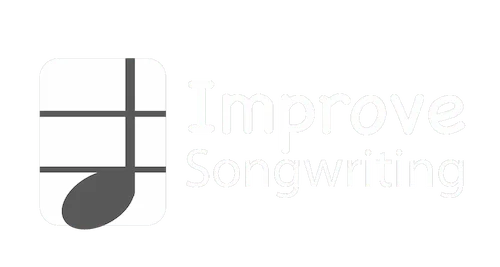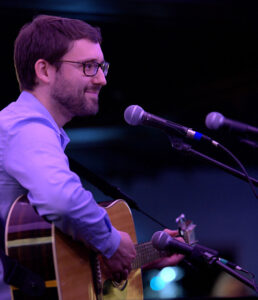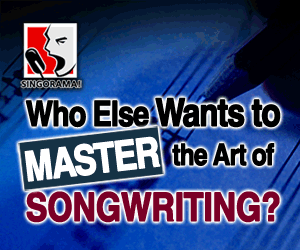“Ugh! Why is songwriting so HARD?!”
Sound familiar? If you’re learning how to be a better songwriter, you may sometimes find yourself frustrated by a lack of progress or ability.
That’s understandable, but think about it this way: as a consumer, you’re constantly being bombarded with the most well-produced and commercially successful filmmaking, writing, comedy, and songwriting in all of entertainment!
Experts make it look easy, almost effortless, as if their work were predestined to become artistic masterpieces.
But this isn’t how it works behind the scenes! What you don’t see are the years and years of learning, practice, struggle, and experimentation needed to perfect their craft – and the teams of people paid good money to make the final product shine.
Is It Hard to Write a Song?
I have a theory.
When people ask, “Why is songwriting so hard?”, what they’re really asking is, “Why is it so hard to write great songs?”
Because let’s be honest here… Writing a song isn’t THAT difficult! You just need four chords, a basic melody, and some simple lyrical phrases to do that.
But if you want to write a truly memorable song, that takes rare, hard-won talent.
So, are you ready to master songwriting? Here are 3 reasons why songwriting is so hard – and what you can do to make it a LOT easier!
1) Songwriting is Actually Several Skills at Once
The term “songwriting” is a bit deceptive. It sounds like you just have to practice and improve at one specific skill: writing songs.
But songwriting is actually several different skills all rolled up into one. Off the top of my head, here are just SOME of the skills a successful songwriter should probably have:
- Playing musical instruments and singing
- Reading music notation
- Understanding music theory
- Composing music (harmonies and melodies)
- Writing lyrics
- Arranging and instrumentation
- Audio production and engineering
- Performing live
In a nutshell, to be a well-rounded songwriter, you need a LOT of knowledge and experience in several different areas!
Yes, it’s true that you could focus on just writing music and lyrics. That might technically be all you need to know to actually write a song.
The problem with that approach is, you’re missing out on many other key skills that support great songwriting:
- Sitting down to mess around with some riffs on your guitar
- Using your knowledge of theory to program a synth part in your digital audio workstation (DAW)
- Testing your songs in public to see what people respond best to
- And more…
In the end, even if you’re not the one playing, recording, mixing, or performing your song, understanding how to do these things will be instrumental (pun intended) in your songwriting craft.
Action Steps:
- Pick just one songwriting skill for active improvement. It can open up a whole new world of creativity if you address some of your weaker skills – so practice a new instrument, learn mixing, give sight reading a shot. Try improving just one skill at a time to keep from getting overwhelmed. Every little bit helps!
2) You Don’t Understand the Creative Process
I’ve got good news and bad news.
The good news: You’re not that special!
Hang on, let me finish…
I mean that if you feel like a freak because you have a tough time with songwriting or any other creative endeavor, realize that EVERYONE struggles with creativity nearly 100 percent of the time!
On occasion, you’ll have bursts of brilliance where it feels like an amazing song just “wrote itself.” There are interviews with successful artists like Thom Yorke who describe that experience, and I’ve had it a few times myself.
I won’t lie… It’s super cool to create some of your best work with almost no conscious effort, where it just flows onto the page or out of your instrument.
But here’s the bad news: you can’t DEPEND on divine inspiration if you want to write songs… Songwriters block is a real thing!
If you haven’t learned much about the creative process before, I recommend you look into how it actually works. One great source is Austin Kleon’s excellent book about creativity.
As you learn more about how creativity works, make a plan to incorporate some of the action steps below into your next songwriting session!
Action Steps:
- Be more consistent. Is there a regular time when you do your songwriting? It might seem like tired advice, but it’s still true: a huge part of creative success is just “showing up.” If you don’t feel like your output is where it could be, it’s possible that you just aren’t consistent enough. Try setting a regular day and time for your creative pursuit!
- Switch up your process. Do you approach songwriting the same way, every… single… time? Same room, same songwriting partners, same chord progressions and keys in your music? It’s hard to break new creative ground when you’re always under the same conditions. See if switching things up can inspire you!
- Take a break. If you’re struggling to get somewhere on a project, give yourself permission to take a step back. Go for a walk, do some chores, or even shelve the song for a few days. Sometimes, your subconscious will keep working on the problem – and when you sit back down, you’ll experience a breakthrough!
3) You’re Pressuring Yourself to Be Great Too Soon
You may not realize how much time and effort is needed for great music and great lyrics, even for established and successful artists. It varies a lot, but all the stories about a professional artist sitting down and banging out an instant classic conveniently leave out the YEARS of practice honing their songwriting chops first!
Here are a few questions to ask yourself:
- How many years have you been writing songs?
- How often do you practice?
- Do you actively study and learn more about the craft of songwriting and making music?
It’s only natural to WANT to be great, but if you’re not there yet, don’t get frustrated – get motivated to keep learning!
There’s a wonderful quote from Ira Glass about the fact that many creatives get interested in their chosen craft because they have excellent taste, but their skill isn’t where it needs to be to realize that taste when they’re still beginners. You have to push through the period where there’s a gap before you can enjoy that greatness you deserve.
Check out the full quote in this great video below!
Action Steps:
- Be patient and focus on the process, not the result. Everyone wants to be great, but every moment you spend daydreaming about gold-plated jacuzzis and doe-eyed groupies – or tenure-track positions as a music professor, for us academics – is a moment that you could be devoting to the craft itself. Be dedicated to improving every day. The greatness will follow.
- Follow the experts. Try discovering what the best songwriters have done to succeed, both in their work and in the music business. It’s not always easy to find a mentor in any field, but if you want a fast track to success, there’s nothing stopping you from studying what the greats do by reading books, watching interviews, and immersing yourself in their music. (Word of advice: Don’t ever straight up ask someone: “Will you be my mentor?” Just show interest and talk to them, and if it naturally develops that way, then cool!)
Bonus Tip: Be a Sponge!
In his excellent book On Writing, Stephen King gave aspiring writers some sage advice: “If you want to be a writer, you must do two things above all others: read a lot and write a lot.”
Well, the same thing is true for songwriters! The more music you listen to, the more fodder you have for inspiration. It’s especially helpful when you’re in a rut to listen to some of your favorite music – or to brand-new artists and genres you’ve never even heard before!
Of course, you don’t have to stop with songs. Pay attention to the news, read articles and books, watch influential films, go to a museum… By absorbing everything you can get your hands on, you’re able to make interesting lyrical and musical connections in your songs.
Some of the most important songwriters of all time – such as Bob Dylan and John Lennon – had memorable messages and themes woven in throughout their work. These ideas came from being invested in current events and the culture of their day. Other songwriters may lean heavily on their knowledge of classic literature, pop culture, or the latest trends.
Whatever your songwriting niche is, it pays to pay attention.
Why is Songwriting So Hard Wrap-up
So, we started off asking: is it hard to write a song? Like, really?
The answer is mostly yes.
As with any creative skill, songwriting can be intimidating for beginners. But even songwriting veterans don’t always produce magic on command.
Creativity is something that no one fully understands. Some days, your creative output could put Leonardo da Vinci to shame – and other days, you’re just proud that you managed not to put your shirt backwards.
With that said, the better you understand creativity and the creative process, the easier it’ll be to make deliberate progress on your songwriting skills over time.
And maybe someday, when someone asks you why songwriting is so hard, you’ll finally be able to say: “Honestly… it isn’t!”
If you actually want to improve at songwriting, playing piano and learning different styles of music will take you really far. I’ve found Piano for All to be a fantastic resource not only for becoming a better musician, but also a stronger songwriter. Check it out!
Improve your songwriting by mastering piano.
$49
ONLY

![Why is Songwriting So Hard? [The 3 Top Reasons]](https://improvesongwriting.com/wp-content/uploads/2019/09/Why-is-songwriting-so-hard-1280x640.jpg)

![What Makes a Song Good? [5 Great Song Tips for Songwriters]](https://improvesongwriting.com/wp-content/uploads/2021/10/What-Makes-a-Song-Good-440x264.jpg)
![Get Rid of Songwriter’s Block [With 5 Epic Songwriting Exercises for Writers!]](https://improvesongwriting.com/wp-content/uploads/2021/09/How-to-Get-Rid-of-Songwriters-Block-440x264.jpg)




